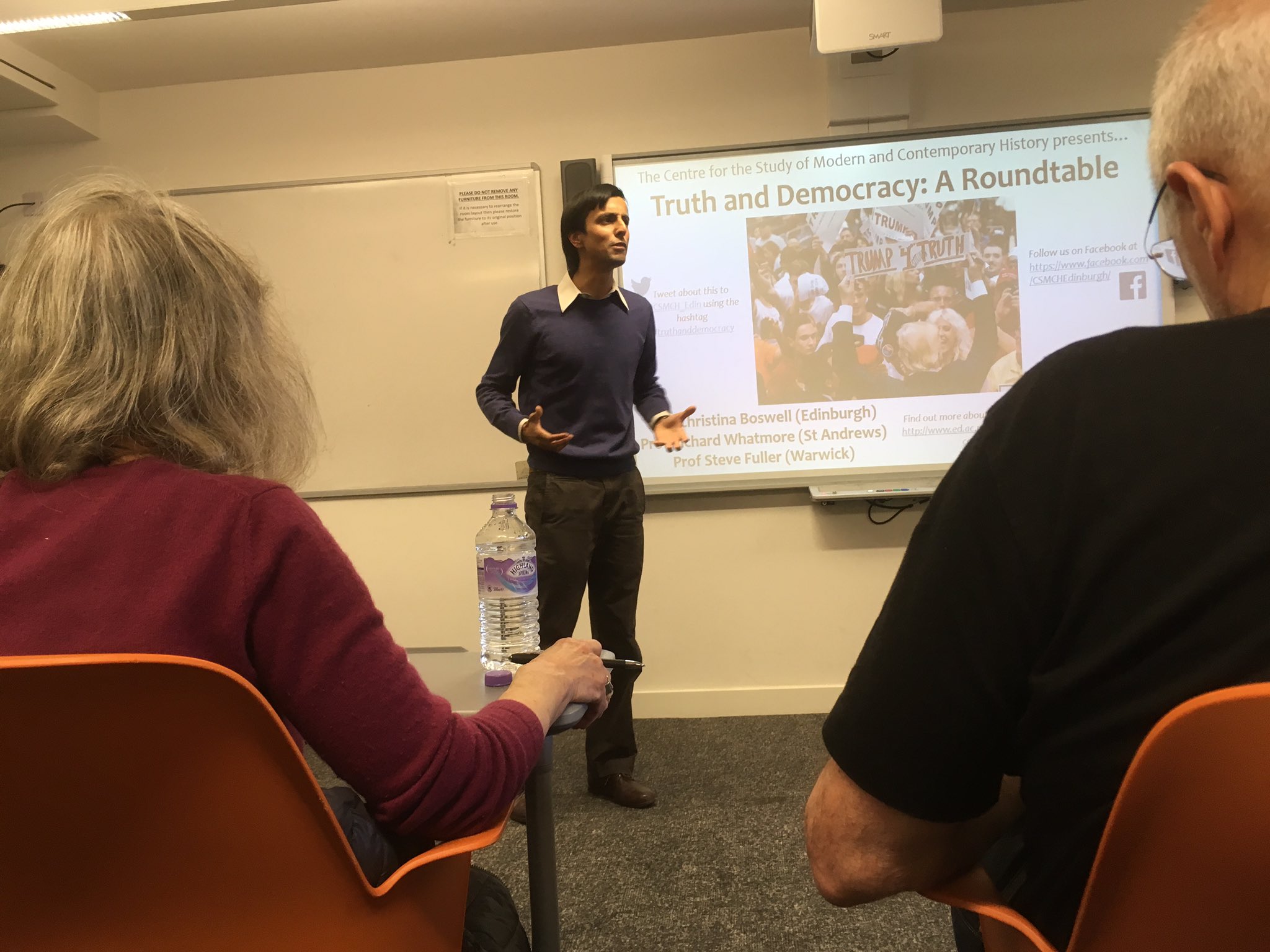Our first event of the year – a roundtable on ‘Truth and Democracy’ – took place last night in a packed room in the David Hume Tower. Centre director, Emile Chabal, gives a flavour of the discussion. You can also click on the links to the podcasts if you would like to listen to each speaker’s presentation in full.

The topic of the roundtable was, as one of the speakers pointed out, a very ambitious one. There is nothing self-evident about ‘democracy’, much less ‘truth’. But we were lucky to have three distinguished speakers to offer contrasting perspectives. Unusually for a history seminar, the evening was characterised by sharply diverging opinions, both in the initial presentations by the speakers and the lively discussion afterwards.
Our first speaker was Christina Boswell, Professor of Politics at the University of Edinburgh. She is one of the leading experts in the fields of knowledge, public policy, and migration. Drawing on her extensive research on policy makers in the UK and elsewhere in Europe, she suggested that ‘truth’ was not – and should not – be a key factor in democratic politics. Instead, she proposed that we think in terms of ‘trust’.
Looking specifically at contemporary politics, she also pointed out that the emergence of performance targets and ‘new public management’ in the 1990s were initially conceived as ways to demonstrate the ‘truthfulness’ and ‘trustworthiness’ of political claims. But these measurements have proved to be, at best, a mixed blessing.
Christina ended her talk by exploring the tensions between a ‘ritualistic’ respect for supposedly objective ‘data’ and ‘targets’, and a more ‘impressionistic’ belief in the value of symbolic cues.
Our second speaker, Richard Whatmore, is Professor of Intellectual History at the University of St Andrews. He opened his talk with the arresting claim that, historically, political thinkers have generally seen representative democracy as a form of ‘deceit’, which purports to empower the people, but only does so very briefly at election time. He also reminded us that most of these same thinkers have been very fearful of mob rule and altogether sceptical about the principle of democracy.
In the latter part of the presentation, Richard turned his attention to Adam Smith and David Hume, and in particular their discussions of the relationship between commerce and politics. Smith and Hume had stark warnings about the corruption of politics by commerce and, in today’s neo-liberal society, there was ample evidence of what this might mean in practice.
Richard ended by suggesting that politicians and political actors have become too closely intertwined with the worlds of business, lobbying and trade. In the process, they are losing their sense of duty and the common good.
Our final speaker, Steve Fuller, is Auguste Comte Chair of Social Epistemology at the University of Warwick. In his brief presentation, he challenged us to rethink the notion of ‘post-truth’. Rather than view this terms in a purely negative light as a ‘distortion’ of the truth, he argued that we would be better off seeing it as a recognition of the intractable and essentially contested game of politics.
To illuminate his point, he repackaged Machiavelli and Pareto’s metaphor of the ‘lions’ and the ‘foxes’. The lions are those who defend the status quo; the foxes are those who seek to overturn it. In the current context, Brexit and Trump could be considered examples of the foxes taking charge.
The important point, however, is that a post-truth world is one in which we do not simply participate blindly in this battle between lions and foxes, but begin to recognise that this game is actually happening in the first place. Post-truth, in Steve’s words, is a ‘meta’ understanding of politics.
The question and answer session that followed the three talks was as wide-ranging and stimulating as the talks themselves. Members of the audience raised questions about everything from Facebook to Habermas, and there was a robust exchange between the speakers about the relative importance or otherwise of basic standards of ‘truth’ in a democratic system.
All in all, this was a wonderful way to kick off this year’s programme – learned, polemical, thoughtful, and far-reaching. We’ve set a high bar for the rest of the year!
— Emile